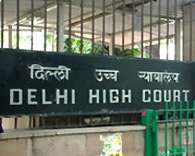Advocate Monica Garg, who represents the central Government, found herself in a spot when the two ministries she is representing in the Delhi High Court maintain contradictory positions on Section 377.

Section 377 of the Indian Penal Code has its identical twins in Bangladesh, Malaysia, Sri Lanka and Singapore. Britain decriminalised sexual relations between consenting male adults in 1967.
The affidavit filed by NACO said that enforcement of the law can adversely contribute to pushing the persons suffering from HIV underground which would make such risky sexual practices go unnoticed.
The court was hearing a petition filed by a non-profit group, Naz Foundation, which is seeking the exclusion of sexual acts between consenting adults by reading down Section 377 which criminalises sexual relations between men as well as other acts including oral and anal sex between adults of any biological sex.
Gay activist and founder of NGO Humsafar Ashok Row Kavi clarifies in a media report that the PIL does not seek a repeal of Section 377.
"The court has been urged to read down Section 377, so as to decriminalise homosexuality," said Kavi, adding that more than legal repercussions, it is the social consequences that makes the law draconian.
Section 377 states that: "Whoever voluntarily has carnal intercourse against the order of nature with any man, woman, or animal, shall be punishable with imprisonment for life or with imprisonment of either description for a term which may extend to 10 years and shall also be liable to fine."
The Home Ministry opposes the modification of the law - a relic of British colonial rule, on the grounds that the change will open the floodgates of delinquent behaviour and that the public is not ready for such a change.
Garg was quoted by India's Daily News and Analysis (DNA) as saying in her submission, "I have earlier written to the government that I would not be able to represent both the ministries but I have not got a reply."
She added that for the time being she would represent the Ministry Of Home Affairs which is in favour of penal provision against homosexuals.
The petition was first filed in 2001 by Naz Foundation (India) Trust, an NGO working on HIV/AIDS, but it was rejected in 2004 by the Delhi High Court, on grounds that the petitioner has no locus standi (the ability of a party to demonstrate to the court sufficient connection to and harm from the law or action challenged to support that party's participation in the case). The organisation appealed to the Supreme Court which remanded the case back to the Delhi High Court, saying that it was an important matter that had to be heard expeditiously.
"Section 377 demeans a gay man. It silences a gay man into accepting the discrimination against him. He will not come out to declare his orientation," the NGO said in its petition.
The hearing continues on May 21.











 Printable Version
Printable Version











Reader's Comments
Around the world gays have had to cope with this type of institutional behaviour. Repressive and unreasonable laws have never been successful in the long term nor do they provide for the betterment of the widersociety.
Social change engineers itself and as the wider communities become familiar with the gay world they will also become more tolerant. The government needs to respond to this but can hardly act as leaders in social change when it is hampered by archaic laws.
Many enlightened governments that have repealed anti-gay laws have not regretted their decisions nor considered reversing their actions. Gays in these countries are a part of every day life and are of no particular concern to anyone.
Please log in to use this feature.